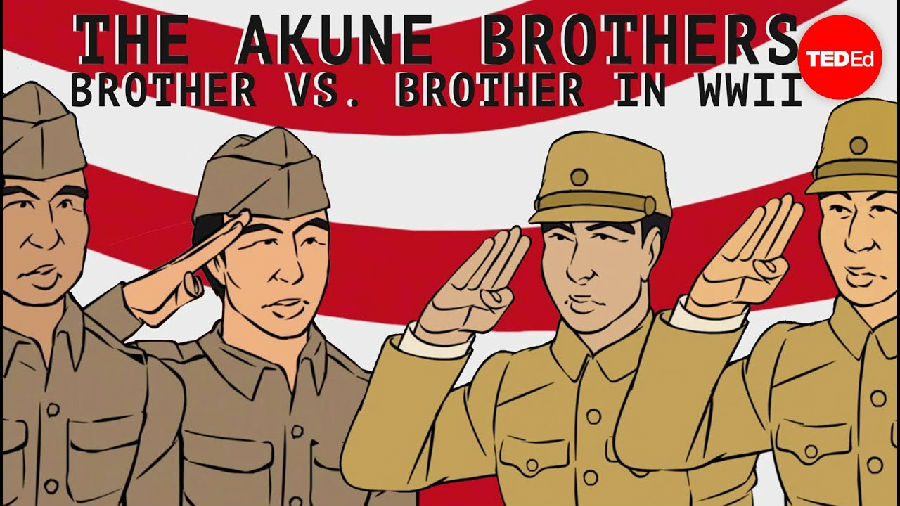(单词翻译:单击)
There are many stories that can be told about World War II, from the tragic to the inspring.
关于第二次世界大战,有很多故事可以讲述,既有悲壮的,也有励志的。
But perhaps one of the most heartrending experiences was that of the Akune family,
但或许最荡气回肠的故事之一是有关阿久根家族的故事,
divided by the war against each other and against their own identities.
他们一家被战争所分隔。
Ichiro Akune and his wife Yukiye immigrated to America from Japan in 1918 in search of opportunity,
阿久根一郎和他的妻子于1918年从日本移民至美国,寻找机遇,
opening a small grocery store in central California and raising nine children.
在加州中部开了一家小杂货店,并抚养9个孩子。
But when Mrs. Akune died in 1933, the children were sent to live with relatives in Japan, their father following soon after.
但是在1933年阿久根夫人去世时,孩子们被寄在日本的亲戚家里,很快他们的父亲也回到了日本。
Though the move was a difficult adjustment after having been born and raised in America,
尽管这次环境的转变很困难,尽管在美国土生土长,
the oldest son, Harry, formed a close bond with his grand uncle,
但长子哈利与他的大伯关系很好,
who taught him the Japanese language, culture and values.
大伯教会了他日语、日本文化以及价值观念。
Nevertheless, as soon as Harry and his brother Ken were old enough to work,
然而,在哈里和他弟弟肯到了能够工作的年龄,
they returned to the country they considered home, settling near Los Angeles.
他们回到了生养他们的国家,在洛杉矶附近安顿下来。
But then, December 7, 1941, the attack on Pearl Harbor.
但是,在1941年12月7日,珍珠港事件爆发。
Now at war with Japan,
美国与日本开战,
the United States government did not trust the loyalty of those citizens who had family or ancestral ties to the enemy country.
美国政府对那些与敌国有血缘关系的美国公民并不信任。
In 1942, about 120,000 Japanese Americans living on the West Coast
1942年,约有12万美籍日本人居住在美国西海岸,
were stripped of their civil rights and forcibly relocated to internment camps,
被政府剥夺了他们的公民权利,并被迫转移到集中营,
even though most of them, like Harry and Ken, were Nisei,
尽管大部分人与哈里和肯一样,都是第二代日裔美国人,
American or dual citizens who had been born in the US to Japanese immigrant parents.
即他们的父母是日本移民,出生于美国的居民或双重国籍的居民。
The brothers not only had very limited contact with their family in Japan,
两兄弟不仅与他们在日本的家人联系受限制,
but found themselves confined to a camp in a remote part of Colorado.
而且他们发现自己被禁锢在科罗拉多边远地区的一个集中营里。
But their story took another twist
但他们的命运却峰回路转,
when recruiters from the US Army's military intelligence service arrived at the camp looking for Japanese-speaking volunteers.
当美军情报局的征兵人员来到集中营里寻找会讲日语的志愿者。
Despite their treatment by the government,
尽管美国政府对他们不公,
Harry and Ken jumped at the chance to leave the camp and prove their loyalty as American citizens.
但是哈利和肯还是抓住机会离开了集中营,并证明了他们作为美国公民的忠心。

Having been schooled in Japan, they soon began their service,
因为在日本接受教育,他们的工作很快上手,
translating captured documents, interrogating Japanese soldiers,
翻译缴获的文件,审问日本士兵,
and producing Japanese language propaganda aimed at persuading enemy forces to surrender.
并制造意在说服敌军投降的日语宣传口号。
The brothers' work was invaluable to the war effort,
两兄弟的工作对战事的贡献无量,
providing vital strategic information about the size and location of Japanese forces.
对日军的方位和人数提供了关键的战术信息。
But they still faced discrimination and mistrust from their fellow soldiers.
但是他们仍然受到同伴的歧视和不信任。
Harry recalled an instance where his combat gear was mysteriously misplaced just prior to parachuting into enemy territory,
哈里回想起有一回他的搏击装备在降落在敌军地带前被神秘的调换了,
with the white officer reluctant to give him a weapon.
而白人军官并不情愿给他一支武器。
Nevertheless, both brothers continued to serve loyally through the end of the war.
尽管如此,两兄弟始终忠诚的为自己的国家服务,直到战争结束。
But Harry and Ken were not the only Akune brothers fighting in the Pacific.
但是哈里和肯并非阿久根家族在太平洋作战的唯一的两兄弟。
Unbeknownst to them, two younger brothers, the third and fourth of the five Akune boys,
他们有所不知的是,他们的两个弟弟,阿久根家五兄弟中的第三和第四个儿子,
were serving dutifully in the Imperial Japanese Navy, Saburo in the Naval Airforce,
正在日本皇家海军服役,其中三郎在海军航空兵服役,
and 15-year-old Shiro as an orientation trainer for new recruits.
而15岁的四郎为培训师,培训新征入伍的士兵。
When the war ended, Harry and Ken served in the allied occupational forces and were seen as traitors by the locals.
战争结束后,哈里和肯因为盟军效力而被当地的日本人视为叛徒。
When all the Akune brothers gathered at a family reunion in Kagoshima for the first time in a decade,
当阿久根家的兄弟时隔一载于鹿儿岛再聚一堂的时候,
it was revealed that the two pairs had fought on opposing sides.
两对兄弟在战场上各自为敌。
Tempers flared and a fight almost broke out until their father stepped in.
火气上升差点大打出手,直到他们的父亲介入。
The brothers managed to make peace and Saburo and Shiro joined Harry and Ken in California,
几位兄弟最终设法和解,三郎和四郎与哈里和肯一起回到加州,
and later fought for the US Army in Korea.
在后来并肩为在韩国为美军效力。
It took until 1988 for the US government to acknowledge the injustice of its internment camps and approve reparations payments to survivors.
直到1988年美国政府才承认集中营的非正义对待,并同意给生还者赔偿。
For Harry, though, his greatest regret was not having the courage to thank his Japanese grand uncle who had taught him so much.
对哈里来说,最大的遗憾就是没有勇气感谢培养他的日本大伯。
The story of the Akune brothers is many things:
阿久根兄弟的故事展现了许多东西:
a family divided by circumstance, the unjust treatment of Japanese Americans,
一个家庭因环境而分离,对美籍日本人的不公平对待,
and the personal struggle of reconciling two national identities.
以及调和两个国家身份的个人斗争。
But it also reveals a larger story about American history:
但它同时揭示了美国历史更大的一面:
the oppression faced by immigrant groups and their perseverance in overcoming it.
外来移民群在美国面对的压迫以及他们克服种种压迫的毅力。


